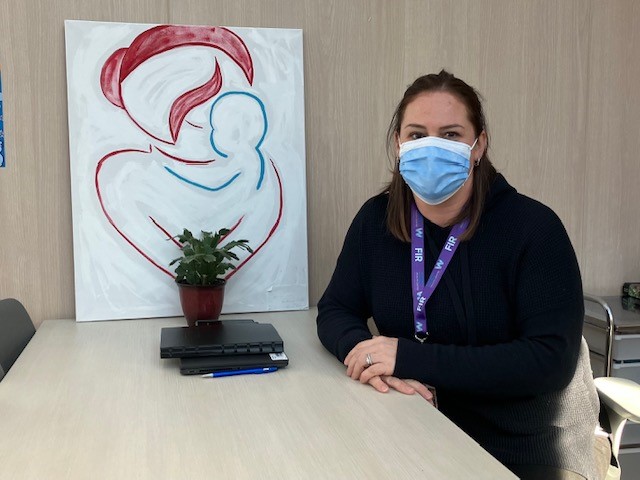In part two of our series on Powerful Parents, between Mother’s Day and Father’s Day, we talk to BC Women’s Patient and Family Advisor Melissa Dreyer.
 Melissa Dreyer sits in a corner of the patient lounge area of the FIR unit on a grey Vancouver afternoon. She's unassuming and there to chat with pregnant or new mothers who use substances at BC Women's Hospital + Health Centre.
Melissa Dreyer sits in a corner of the patient lounge area of the FIR unit on a grey Vancouver afternoon. She's unassuming and there to chat with pregnant or new mothers who use substances at BC Women's Hospital + Health Centre.
Three FIR patients nearby go through a box of donated clothing, laughing together as one pulls out a piece of hot pink lingerie.
Melissa used to be in their shoes.
“I get to introduce myself as somebody with lived experience. That is, quite often, the great segue of a relationship," she says. “It's like 'Oh, you understand what I'm going through.' I think that's a huge piece for a lot of people."
About 15 years ago, Melissa was addicted to crack cocaine and all five of her children were removed from her care. She was in an unhealthy relationship and living with no fixed address. On the day her fifth child was born, her physician referred her to FIR. This is where her recovery journey began, which ultimately led to her current role as a patient and family advisor at BC Women's.
Melissa now provides direct patient care support and participates in site-based strategic initiatives, research, and provincial partnerships to ensure the experiences and voices of people with lived/living experience are reflected in our approach to care both locally and provincially.
Making connections is crucial in helping pregnant and parenting women who use substances. But staff and physicians on FIR are clear – it's our patients who choose their own path.
“When I was a patient on FIR, I was supported to identify how I wanted to move forward, whereas prior to coming here, it was people saying, 'I need you to do this or that before I consider giving your kids back.'"
Melissa was worried she would lose her last daughter, along with her other children, and didn't know what to do.
.jpg) “I just felt pretty hopeless with the circumstances I was facing," she says. “But at FIR, the care that I received empowered me to come up with goals, and then supported me to come up with a plan to accomplish them. It was the first time that I felt supported in bonding and caring for my baby."
“I just felt pretty hopeless with the circumstances I was facing," she says. “But at FIR, the care that I received empowered me to come up with goals, and then supported me to come up with a plan to accomplish them. It was the first time that I felt supported in bonding and caring for my baby."
FIR opened in 2003 to support pregnant and parenting women using substances requiring stabilization of substance use, keeping mothers and babies together when possible. The Combined Care Unit has 13 beds. There is a nursery for babies who need specialized treatment. More than 80 pregnant or new mothers were treated at FIR last year.
The prioritization of mother and baby togetherness on FIR demonstrates a clinical commitment to supporting women to connect and parent their infant as part of their birth experience.
FIR helps improve perinatal outcomes, including increased birth weights, improved growth and development, and reduced incidence of Fetal Alcohol Syndrome/Neonatal Alcohol Syndrome (FAS/NAS), HIV, and Sudden Infant Death Syndrome (SIDS).
Melissa says women who are pregnant or parenting and using substances often feel pressure to have everything figured out right away.
“There's the expectation for women that if you're going to parent your child, you need to stop using substances and it's got to be like flipping a switch: 'Now you've got your life together.' That's, realistically, not how it happens.
"There's a period of stabilizing and identifying what your goals are, and some of it is learning where changes need to be made. That's where harm reduction is really important. You don't give them three strikes and you're out."
It wasn't a straight line to recovery for Melissa. She got her children back, but a couple of years later, she returned to substance use, and her children were removed from her care a second time. She got them back again, and now that she's more than six years abstinent from substances, it's something her family talks openly about.
 “My past isn't a secret, it is just part of my journey that has brought me to where I am today. My kids are well-educated on triggers that can lead to potential substance use. Even though I wouldn't want to repeat the past, it was a path with lessons learned and now enables me to help other mothers and people who might face some of the same barriers I did."
“My past isn't a secret, it is just part of my journey that has brought me to where I am today. My kids are well-educated on triggers that can lead to potential substance use. Even though I wouldn't want to repeat the past, it was a path with lessons learned and now enables me to help other mothers and people who might face some of the same barriers I did."
For more information on referrals or the care FIR provides, please visit the BC Women's website.
Read the other Powerful Parents stories running between Mother's Day and Father's Day:

